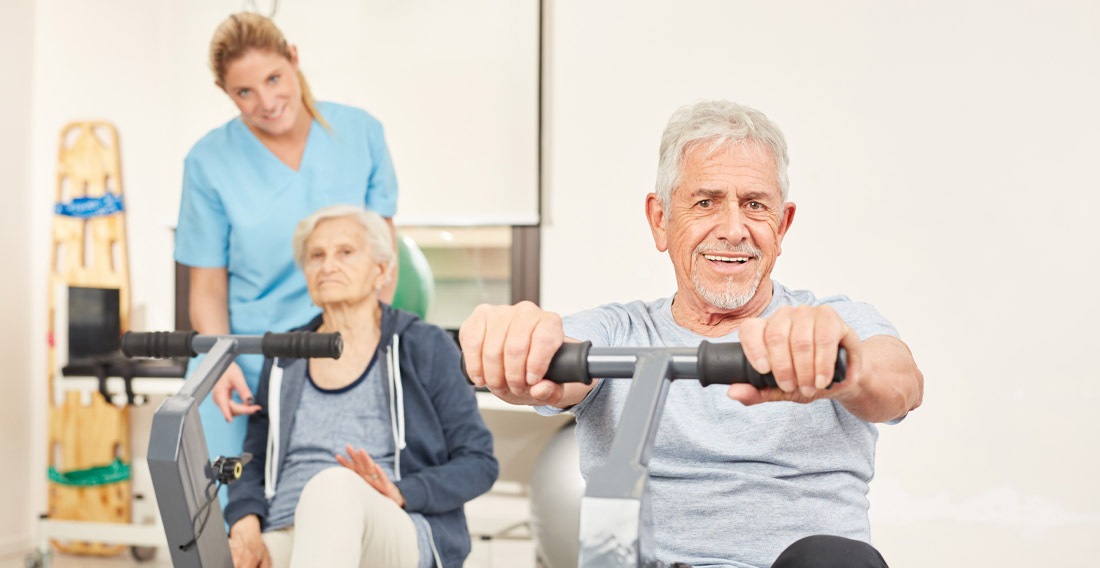Shore's Cardiac & Pulmonary Rehabilitation Center helps you regain control over your health. Bridging the gap between illness and wellness. The program integrates exercise, education, nutritional and physical counseling.
The program’s aim is to stop the progression of the disease and improve your quality of life, permitting a return to your activities of daily living as soon as possible. Shore Cardiac and Pulmonary Rehabilitation Center provides comprehensive services for patients diagnosed with cardiovascular and pulmonary diseases. This hospital-based facility offers patients a monitored and clinically supervised exercise program under the direction of their physician.
The Shore Cardiac & Pulmonary Rehabilitation Center is located on the first floor at 710 Centre Street in Somers Point, across from Shore Medical Center. Open Monday through Friday. Close, convenient and free parking is available just a short distance from the Center's front door. Call 609-653-4677 for further information.
- Methodology
Shore Medical Center's certified cardiopulmonary rehabilitation program provides a monitored, medically supervised program to meet the needs of the cardiovascular and pulmonary patients. The highly trained multidisciplinary staff including a registered nurse and exercise physiologists create customized programs to meet the physical, psychological and nutritional needs of patients diagnosed with cardiovascular or pulmonary disease.
The primary goals for each patient are to regain strength, stamina, confidence, endurance, to improve their quality of life, reduce risk factors and prevent the progression of the disease.
Thinking Healthy
Aside from the physical elements of the program, emphasis is also placed on the nutritional and psychological components of rehabilitation. A patient's mental outlook may have suffered as a result of trauma. Counseling on modifying risk factors during exercise sessions will help restore confidence and overcome fear of further illness. Patients given nutritional guidance as well, tips on how to reduce your fat intake and cut down on calories are provided during the course of the program.Back to Normal
The average patient regimen calls for 60 to 90 minutes of supervised exercise three times per week for 10 to 12 weeks. Once the patient is showing progress, they will be encouraged to move on and work out independently. Our staff will even make arrangements with local health clubs to ensure you have a place to train on your own once you’ve completed our program. Call 609-653-4677 for further information about Shore’s Cardiopulmonary Rehabilitation Center or to schedule a tour of our facility.- Treatment
Recovering from a cardiac or pulmonary event that has resulted in hospitalization can be both difficult and frightening. Patients often must make dramatic lifestyle changes. Exercise routines, which are essential to returning to healthy living, present challenges to those who are afraid of physical activity after a cardiac or pulmonary episode.
At the start of the program, you’ll be given an evaluation. The center’s staff then designs a customized workout program that will challenge you without overwhelming you. As you exercise in the comfort of the center’s modern facility, you’ll have the peace of mind of knowing that you are being electronically monitored for any sign of irregularity in oxygen level, heart rhythm, blood pressure or other vital functions. Medical treatment is seconds away for patients if needed. A staff of exercise physiologists and specialists not only supervises your workouts, but provides positive reinforcement as well
- Candidates
Cardiac Rehabilitation Candidates
Cardiac patients who have been diagnosed with angina, heart attack or have undergone serious interventions including bypass surgery, angioplasty, stents valve surgery, Left Ventricular Assist Device (LVAD) implantation or heart transplant are likely candidates for cardiac rehabilitation. As part of the evaluation process, the cardiac patient is generally required to have a low-level stress test prior to enrollment in the program.Pulmonary Rehabilitation Candidates
Pulmonary patients who have been diagnosed with emphysema, chronic bronchitis, acute or chronic asthma, Chronic Obstructive Pulmonary Disorder (COPD), interstitial pulmonary fibrosis, sarcoidosis, pulmonary hypertension, cystic fibrosis or pre- and post-lung surgery are likely candidates for pulmonary rehabilitation. A recent (less than one year) pulmonary function test is a requirement for enrollment into the pulmonary rehabilitation program.Peripheral Artery Disease (PAD)
Peripheral Artery Disease is the narrowing of the blood vessels serving the body’s limbs due to buildup of plaque. Patients who have been diagnosed with venous insufficiency, atherosclerosis, lymphatic conditions, carotid artery stenosis, peripheral artery disease, arterial conditions, chronic venous obstructions or venous malformations are likely candidates for acceptance into our Supervised Exercise Therapy (SET) Program.- Getting Started
Before to starting the program, Cardiopulmonary Rehab requires a physician prescription and insurance information is obtained and verified. Cardiopulmonary rehabilitation is covered by most insurance carriers.
During Your Rehab Visit
After acceptance into one of our programs, the patient will meet with an Exercise Specialist to conduct an Initial Evaluation (IE) interview. This specialist will work with each patient to formulate a program that meets their individual needs. Things that one might expect during a visit will be to exercise on a treadmill, bike, rowing machine or using light weights and strengthening bands. Be monitored for change in symptoms or vital signs, start with a slow program that gradually increases to a more intensive program that allows the patient to work longer and harder, as the physician recommends.Link to Penn Medicine
Link to American Heart Association
Link to American Lung Association








